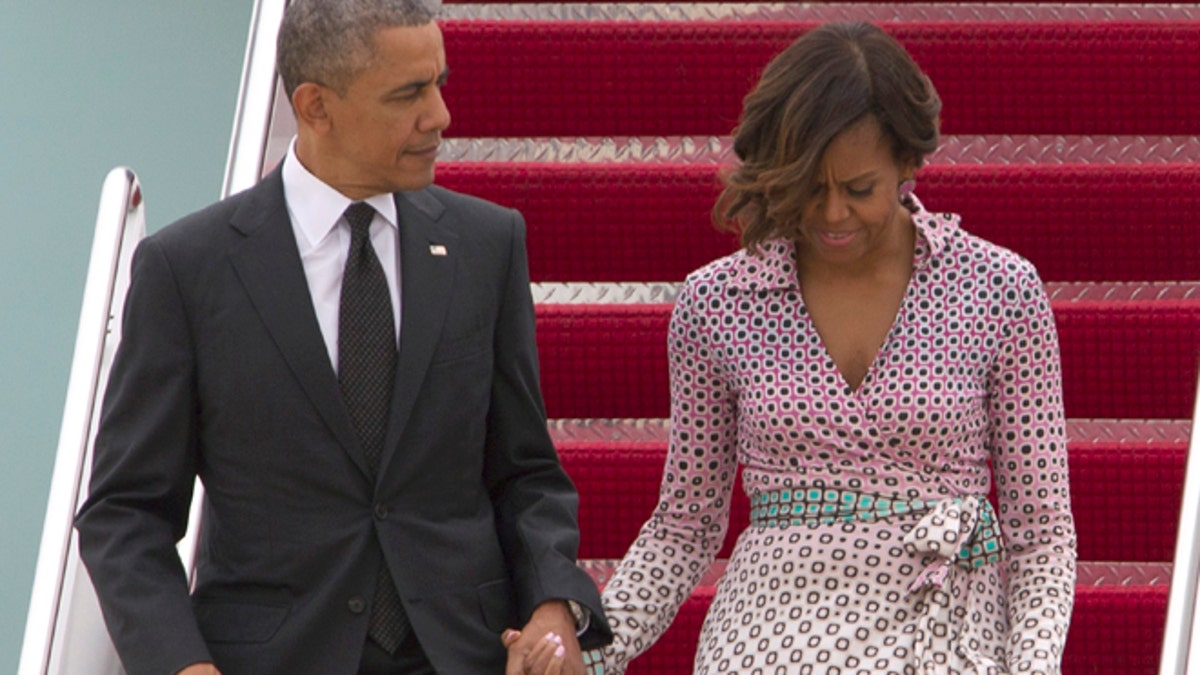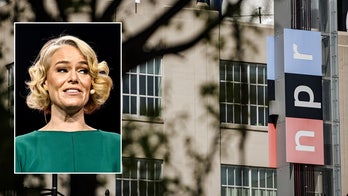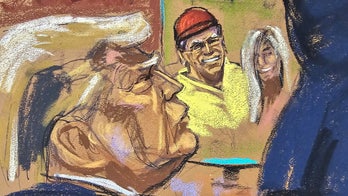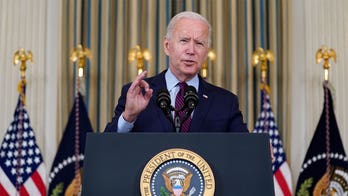
May 15, 2014: President Barack Obama and first lady Michelle Obama walk down the stairs of Air Force One upon arrival at Andrews Air Force Base, Md. (AP)
Barack Obama’s presidency seems to be drifting in its sixth year, as he is all too aware.
Obama has downsized his ambitions, tempered his expectations and is trying to take advantage of the perks of office. He is inviting celebrities for private dinners and spending more time on the golf course.
Oh, and he’s thinking more about his post-White House years.
These are among the takeaways in a major Politico piece that is largely sympathetic to the stymied president, even as it reports on his greatly diminished clout.
“The portrait emerges of a president shadowed by a deepening awareness that his time and power are finite, and that two-thirds of his presidency is already in the past tense,” the piece says.
Obama is said to be reaching out more to the Hill—but some lawmakers dismiss the effort as too little too late:
“For the first time, aides said, Obama is trying to respond to almost every letter from an individual lawmaker with a handwritten note… Almost 40 lawmakers have received invites to travel on Air Force One this year, an increase from 28 at this time last year…Also this year, Obama began setting aside 45 minutes in his schedule every week to call a handful of Republican and Democratic lawmakers — more than 70 so far.”
And yet that’s produced almost nothing in the way of legislation. Asked by Democratic Sen. Mark Begich whether he would fight to keep their majority, Obama replied: “I don’t really care to be president without the Senate.” And yet he may soon find out what that’s like (as Bill Clinton did in his last six years).
Liberated from worrying about reelection, Politico says, Obama is “much freer to talk about things that matter to him,” such as race and his regrets about his early drug use. He is seeing a Broadway play or two and hosting “star-studded dinners” with the likes of Alonzo Mourning, Bono, Will Smith and Samuel L. Jackson.
He spent 46 days playing golf last year, compared to 19 in 2012, having largely given up basketball for fear of injury.
All well and good—presidents have to relax—but imagine a more critical approach: Obama has basically checked out. He knows he can’t get much more done. Instead he’s hanging out with the glitterati and hitting the links.
That’s an overstatement too. But as we learned in George W. Bush’s second term, once a president’s public standing sinks too low, he is forced to coast for the remainder of his tenure. Obama can still take executive action, as with Monday’s EPA initiative to cut power-plant emissions by 30 percent.
Still, Politico’s most critical passage says that “a presidency built on finding ways to elude Congress is a remarkable descent for a leader whose second inaugural address was an audacious call to arms for a liberal resurgence. These days his actions reflect a conclusion that his best option is to navigate shrewdly within narrow limits rather than soar above them with transformative politics.”
Five and a half years in, no more soaring.
Obama can, of course, still have a freer hand in foreign affairs, as he demonstrated with his latest Afghanistan troop withdrawal timetable. Now, though, he’s on the defensive over Ukraine and the Taliban prisoner swap for Bowe Bergdahl.
I’m not a fan of blind quotes, but it’s noteworthy that a Democrat in touch with Obama tells Politico: “He is fatigued. His staff is fatigued. I don’t think they’ve got that same drive.”
A president doesn’t have the luxury of fatigue, and Obama will have to confront more crises between now and the end of 2016.
But the media’s attention may drift away, especially once the campaign to succeed him is under way. Clinton’s second term was dominated by the Lewinsky scandal and his family soap opera. Bush, after Katrina, still had to manage the wars in Iraq and Afghanistan. But Obama, in media terms, risks being something I never thought I’d write: dull.




